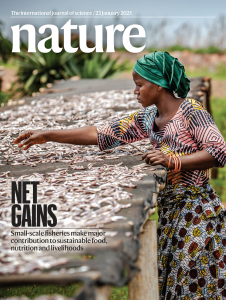[Our translation (google translate)]
Small-scale fisheries play a significant but often overlooked role in global fish production and are key to fighting hunger and malnutrition while supporting livelihoods worldwide, according to research published in Nature.The study, published by an international team of researchers, including BIO’s Jeppe Kolding, is the first to quantify how marine and inland small-scale fisheries contribute to catch, nutrition and socio-economic security on a global scale.
Although definitions vary, small-scale fisheries typically involve households or communities, mainly in low- and middle-income countries, that use less advanced but more labor-intensive fishing techniques for food or income compared to large-scale fisheries. Historically, policy makers have, for various reasons, marginalized and underestimated small-scale fisheries in resource management plans, food systems analysis and agriculture, nutrition and development policies. For example, small-scale fishermen are often grouped together with agricultural workers in censuses.
In 2017, FAO entered into a unique partnership with the international research organization WorldFish and Duke University to assess how small-scale fisheries fit into the UN’s Sustainable Development Agenda, a plan to address global challenges such as hunger, poverty and gender inequality. The new study builds on a 2023 report published by the group, which calls its collaboration the Illuminating Hidden Harvests Initiative (IHH).
“Our main question was simple: Who produces aquatic foods, how and for whom?” said co-author Nicole Franz, who leads the Equitable Livelihoods Team in FAO’s Fisheries and Aquaculture Division and had the original idea for the IHH. “Answering that question was more complicated and required a large team of diverse experts in fisheries science, nutrition, governance, gender and economics.”
The findings reveal that small-scale fisheries are central to achieving the global sustainability goals linked to reducing hunger, poverty and climate change, as well as to strengthening and preserving aquatic resources, women’s rights and economic growth.
The catch from small-scale fisheries accounts for 20% of the dietary intake of six essential nutrients – including vitamins, minerals and omega-3 fatty acids – for 2.3 billion people living within 20 kilometers of a coastline or a large inland body of water. In other words, about one in four people depend on small-scale fisheries for a significant proportion of several key nutrients.
In addition, nearly 500 million people, or one in 12 individuals globally, are partially dependent on small-scale fishing for their livelihoods and to meet basic needs. Almost half of these are women – an under-recognized demographic group in fisheries research.
At least 40% of the global fish catch comes from small-scale fisheries, according to the study. Small-scale fisheries also contribute 44% of the economic value of the country’s catch globally. Among all the small-scale fisheries that were analysed, the African small-scale fisheries contribute the most to global catch and nutrition, but there are still large numbers in the dark.
CITATION:
“Illuminating the Multi-dimensional Contributions of Small-Scale Fisheries.” Xavier Basurto, Nicolas L. Gutierrez, Nicole Franz, Maria del Mar Mancha-Cisneros, Giulia Gorelli, Alba Aguión, Simon Funge-Smith, Sarah Harper, Dave Mills, Gianluigi Nico, Alex Tilley, Stefania Vannuccini, John Virdin, Lena Westlund, Edward H. Allison, Christopher M. Anderson, Andrew Baio, Joshua Cinner, Michael Fabinyi, Christina C Hicks, Jeppe Kolding, Michael C. Melnychuk, Daniel Ovando, Ana M. Parma, James P. W. Robinson, Shakuntala Thilsted. 2025. Nature. Januar 2025.
DOI: 10.1038/s41586-024-08448-z
The research is financed by: Norwegian Agency for Development Cooperation (NORAD), Swedish International Development Cooperation Agency (SIDA), Oak Foundation, samt Consultative Group on International Agricultural Research (CGIAR) gjennom et multi-donor trust fund grant via Resilient Aquatic Food Systems Initiative.

